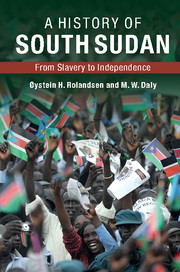Book contents
- Frontmatter
- Contents
- Preface
- Chronology
- List of abbreviations and Arabic terms
- Map
- 1 Introduction: the land and peoples of the upper Nile
- 2 Ivory and slaves: the nineteenth century
- 3 The second Turkiyya, 1898–1953
- 4 The curse of colonial continuity, 1953–1963
- 5 The first civil war, 1963–1972
- 6 Regional government: from one civil war to another, 1972–1983
- 7 Eclipsed by war, 1983–1991
- 8 Factional politics, 1991–2001
- 9 Making unity impossible, 2002–2011
- 10 Independent South Sudan
- Bibliographical essay
- Index
9 - Making unity impossible, 2002–2011
Published online by Cambridge University Press: 05 June 2016
- Frontmatter
- Contents
- Preface
- Chronology
- List of abbreviations and Arabic terms
- Map
- 1 Introduction: the land and peoples of the upper Nile
- 2 Ivory and slaves: the nineteenth century
- 3 The second Turkiyya, 1898–1953
- 4 The curse of colonial continuity, 1953–1963
- 5 The first civil war, 1963–1972
- 6 Regional government: from one civil war to another, 1972–1983
- 7 Eclipsed by war, 1983–1991
- 8 Factional politics, 1991–2001
- 9 Making unity impossible, 2002–2011
- 10 Independent South Sudan
- Bibliographical essay
- Index
Summary
The Sudanese civil war was arguably over by the end of 2002. Two more years of intense negotiations ensued before the signing of the CPA in January 2005. But the difficult compromises and commitment to peace were made in 2002, first in the Machakos Protocol and later with a Memorandum of Understanding on the cessation of hostilities.
Retrospective accounts evoke a sense of inevitability in South Sudan's independence. But the decade after 2002 was a period of transition, of temporality and intermittent negotiation, first over the conditions for peace and then to avoid a new war. It was difficult later to appreciate the frailty of the peace process, which depended on favorable alignment of ever-shifting factors and strategies, most of which were beyond the control of South Sudanese politicians. It was a decade of uncertainty, distrust, and unpredictability, when the parties seemed ready at any time to turn the tables if chance allowed or their own political or physical survival was threatened. And it was a period when the shadow of war in Darfur demonstrated both the limits of the peace process and the depth of the quagmire in which the Sudanese polity was stuck.
Mustering the will to compromise
In 2000–1, the SPLM/A consolidated its position by absorbing or eliminating other armed groups and negotiating treaties with military and political opponents of the regime in the North. New offensives in Raga, Gogrial, Kapoeta, and southern Blue Nile demonstrated the Movement's ability and willingness to continue fighting. Meanwhile, Khartoum focused both its military and political efforts on areas where oil production had begun. By keeping Paulino Matip, the warlord of western upper Nile, in the fold, the regime maintained control over the Unity oil fields; Lam Akol and Gabriel Tangynia continued to operate around Malakal and Melut, and Khartoum retained the support of Baggara Arabs north of the border. The NIF – soon to be retitled the National Congress Party (NCP) – narrowed its base by parting with Hasan al-Turabi and his radical Islamist rhetoric but made the regime more palatable internationally. Relations with neighboring countries also improved, and President Bashir become an active player on the regional scene.
Information
- Type
- Chapter
- Information
- A History of South SudanFrom Slavery to Independence, pp. 133 - 150Publisher: Cambridge University PressPrint publication year: 2016
